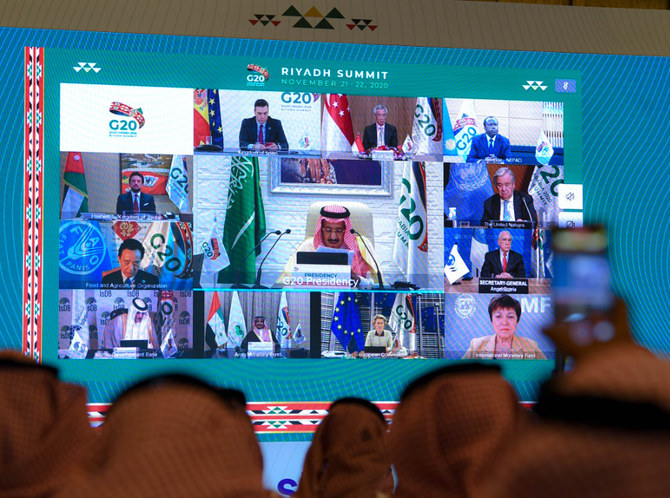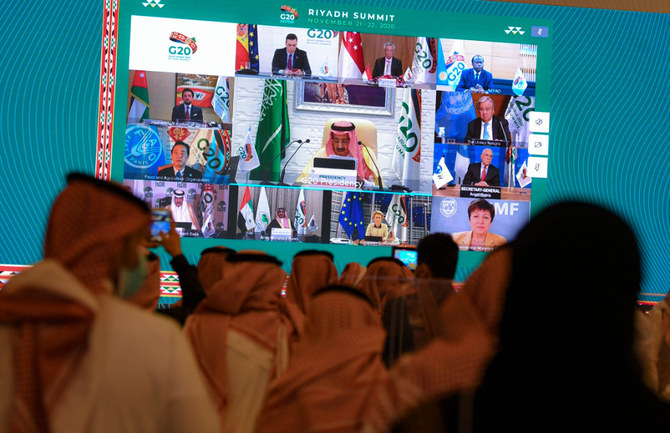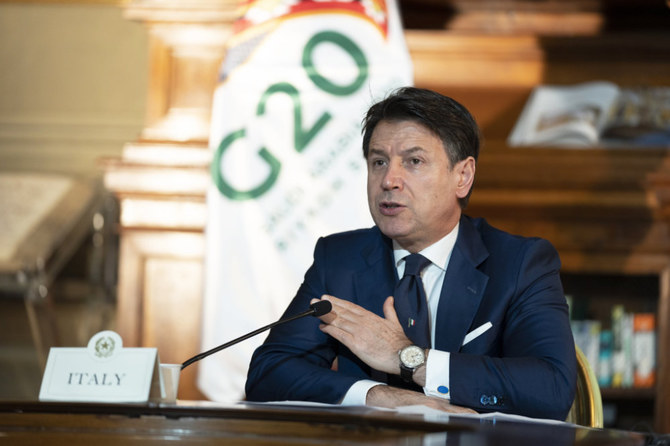RIYADH: Following the successful completion of the G20 Summit in Riyadh on Sunday, Italy assumed the forum’s annual rotating presidency from Saudi Arabia during a ceremonial handover.
The two-day summit, the 15th meeting of the forum, brought together leaders of economies that account for about 85 percent of global gross domestic product to discuss the most challenging socioeconomic issues.
Saudi Arabia’s King Salman formally handed over the G20 presidency to Italy, which will chair next year’s leaders’ summit.
Delivering a short speech to mark the occasion, Italy’s Prime Minister Giuseppe Conte said a decision had been taken that the focus of the world’s premier forum for economic cooperation would continue to be “people, planet and prosperity.”
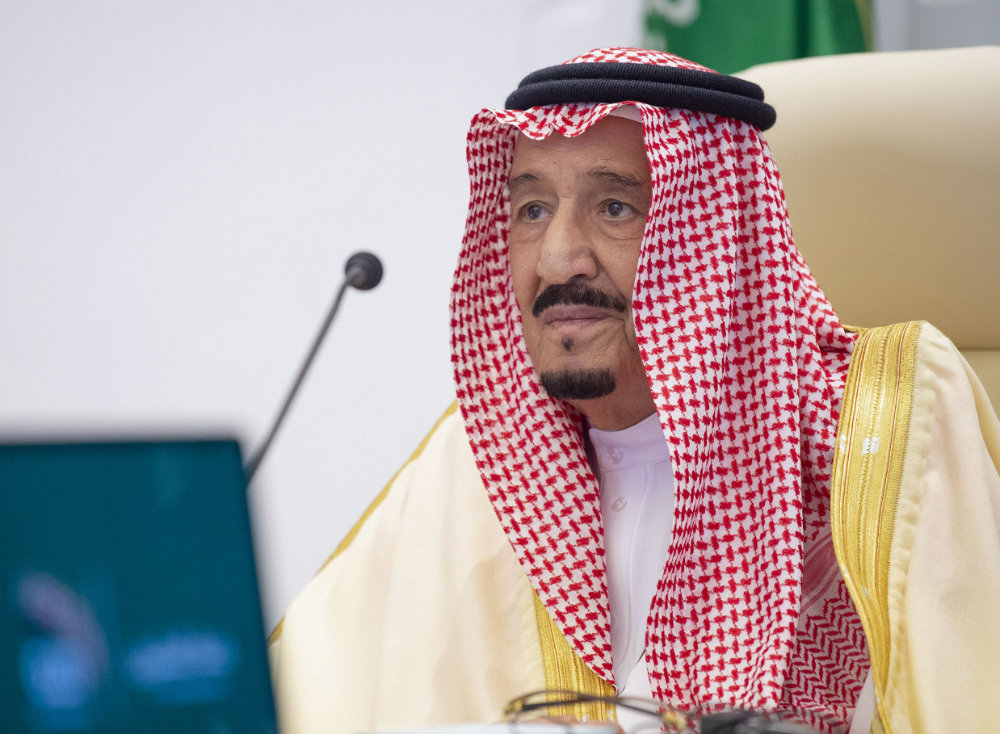
Saudi Arabia's King Salman delivering an address during the second session of the G20 summit, held virtually due to the COVID-19 coronavirus pandemic, in Riyadh. (AFP Photo / Saudi Royal Palace / Bandar Al-Jaloud)
He told fellow G20 leaders on the concluding day of the summit: “In order to achieve a safe and sustainable world, we must first restore the balance between people and nature. On this basis, we will then support economic recovery, advance women’s empowerment, and address poverty and inequalities, both new and old, so that no one is left behind.”
The G20 will “facilitate energy transition and combat climate change, tap the immense opportunities stemming from digitalization and enhance the multilateral trade system, based on the principles of transparency, non-discrimination and inclusivity, in order to adopt a true and efficient multilateral approach,” he added.
Conte underscored the importance of a joint effort to move to a better future. “The goal would only be attainable if we work together, united as a global community of intentions, cooperation and solidarity,” he said.
“If there is a very clear lesson we have learned in these recent months, it is that no country can win global challenges alone. This pandemic has clearly shown that we cannot do this alone,” he added.
“In today’s world, which is so interconnected and interdependent, multilateralism is not one of the many options — it is the only sustainable option.”
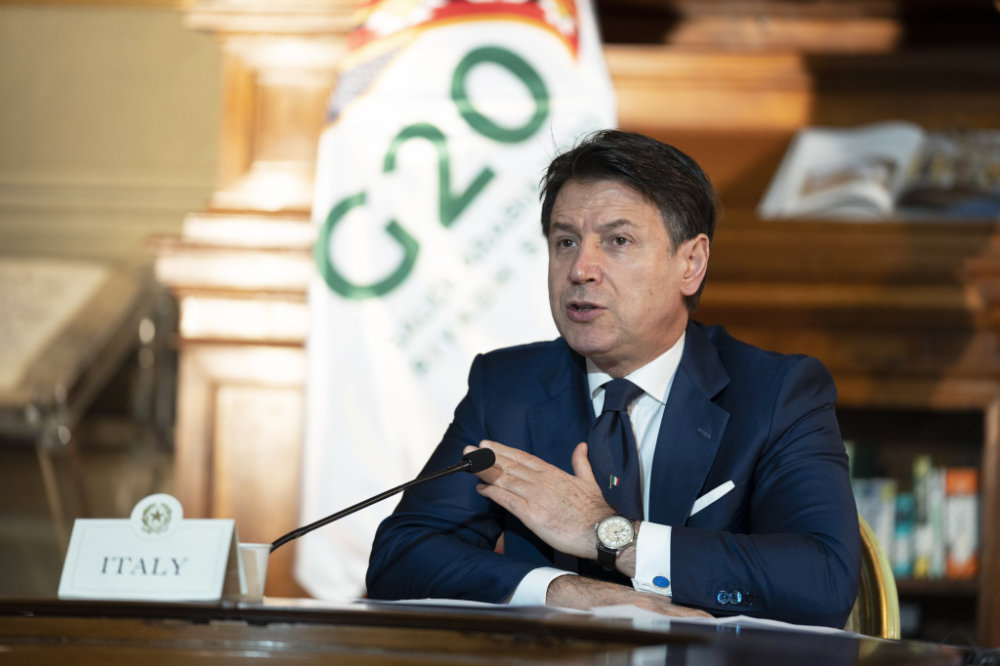
Italy’s Prime Minister Giuseppe Conte attending the virtual summit. (Twitter photo)
Conte said he is confident that Italy can rely on the support of all G20 member states during its presidency, which will culminate in the 2021 G20 Leaders’ Summit on Oct. 30-31 in his country.
The G20 presidency rotates between member countries. Each presidency typically concludes with the G20 Leaders’ Summit, a powerful gathering of heads of state that made its debut in 2008. Saudi Arabia became the first Arab country to assume the role in December 2019.
The normal G20 calendar was changed due to restrictions put in place across the forum’s membership in response to the coronavirus pandemic.
Leaders and ministers held virtual meetings since March to coordinate the international response to the crisis and put the global economy on a pathway to recovery.
In his closing remarks at the end of the summit in Riyadh, King Salman said G20 countries have succeeded in sending a message of hope and reassurance to their citizens and the global community.
IN NUMBERS
- $11 TRILLION - Combined G20 support for individuals, businesses during pandemic.
Referring to the final statement, he said: “It is my honor to announce that the G20 members have adopted this communique. This is what the world has been expecting from us. This achievement today is a culmination of our joint efforts throughout this challenge-fraught year.”
He added: “Our joint and individual actions will be critical in overcoming the immediate global challenge we are facing. Looking forward, through empowering people, safeguarding the planet and shaping new frontiers, we will work on laying the foundations to achieve the main theme of our presidency: Realizing opportunities of the 21st century for all.”
King Salman said the G20 countries have upheld their commitment to working together to confront the pandemic and to safeguard lives and livelihoods.
“We have adopted important policies that will achieve recovery all the way to an economy that is resilient, sustainable, inclusive and balanced,” he added.
“These policies will also maintain the momentum to make the global trade system work for all, and create the conditions to achieve sustainable growth.”
King Salman said although it was the first time Saudi Arabia had held the presidency, it was able “to rise to the challenge” amid the pandemic with the support of member countries.
“Due to its unique stature regionally and internationally, interconnecting three continents and lying at the intersection of emerging and developed markets, the Kingdom will continue to play a key role within the G20 to achieve global cooperation and find solutions to the world’s most pressing challenges,” he added.
The summit’s final statement said: “We, the G20 leaders, meeting for the second time under the Saudi presidency, stand united in our conviction that coordinated global action, solidarity, and multilateral cooperation are more necessary today than ever to overcome the current challenges and realize opportunities of the 21st century for all by empowering people, safeguarding the planet, and shaping new frontiers.”

In his closing remarks to the G20 Riyadh summit, King Salman said although it was the first time Saudi Arabia had held the presidency, it was able “to rise to the challenge” amid the pandemic. (Arab News photo by Basheer Saleh)
The G20 leaders also promised to “spare no effort” to ensure the fair distribution of COVID-19 vaccines and medicines worldwide.
“We are taking immediate and exceptional measures to address the COVID-19 pandemic and its intertwined health, social and economic impacts, including through the implementation of unprecedented fiscal, monetary and financial stability actions,” the statement said.
“We recognize the role of extensive immunization as a global public good. We commend the Saudi presidency for initiating discussions on the need for long-term solutions to address gaps in global pandemic preparedness and response.”
Along with tackling the pandemic, the statement called for protecting the planet and continuing to act against climate change.
“Preventing environmental degradation, conserving, sustainably using and restoring biodiversity, preserving our oceans, promoting clean air and clean water, responding to natural disasters and extreme weather events, and tackling climate change are among the most pressing challenges of our time,” the statement said.
During the Saudi presidency of the G20, 170 meetings were conducted involving ministers of finance, trade and investment, health, education, energy, climate, anti-corruption, agriculture, environment, employment, tourism, digital economy, water and foreign affairs.
In addition, civil society and business groups were represented by eight engagement groups: Business 20, Youth 20, Labour 20, Think 20, Civil 20, Women 20, Science 20 and Urban 20.
They held eight summits and issued eight final statements with a view to bringing civil society and private sector views to the policymaking table.
_______________________
Twitter: @LujainBenGassem



